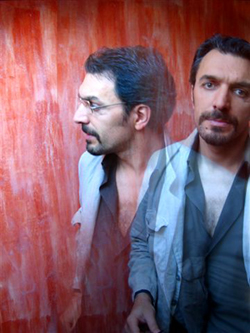|
|---|
|
|---|
(Crossing between images and words in the colours of time ) |
|---|
 |
Biography:
Alessandro Monticelli (1973) Born in Sulmona (AQ) has published poetry collections with Mauro Baroni Publisher (Viareggio) 2004 “Expired Medicine”; Culture Project Publisher (Rome) 2004 “Made in Italy”; Il Foglio (Piombino) 2006 -2nd edition 2007 “Tales from a madhouse”; His works are published in various literary journals (Ellin Sela, Prospektiva, Il Segnale, Tratti, etc.).. Starting from 1999, he begins his multifaceted artistic activity and exhibits his pictures in galleries and museums of many important Italian cities.
|
|---|
Critical comment : The crossing between the words and the colors has always worried me. What is the filament that underlies the artist? The expressive power of the line or the material background painting on the canvas? The art history is steeped in surprising interpretations where the fugacity of the vision replaces the image and image the word, the rhythmic that, again, becomes light and matter crushed on the canvas, on the chalk, in the bronze or in the socket of the marble. (Comment by Pier Luigi Coda) |
|---|
THE POEMS Stazione (interno bagni) Lo colse l’odore acre di sperma e intenso di urina Ti sei allontananta Ti sei allontanata con dovizia di particolari Estate
Sul sagrato delle promesse mai mantenute Sul sagrato delle promesse mai mantenute Come splendore inutile di valuta fuori corso Dietro le spalle il giorno appassisce Leggo di Rothko che nel 1970 a 67 anni E forse anche oggi soprappensiero Forse una festa Quel bambino rigava tutta l’acqua con le dita |
|---|